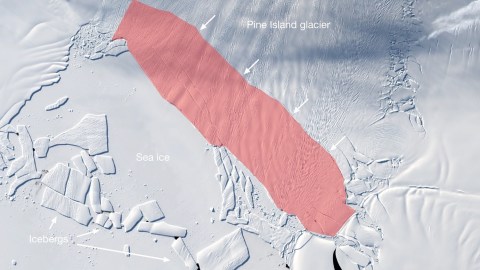The Pine Island Glacier is about to calve another monster iceberg

Credit: Landsat OLI imagery. Processed by Stef Lhermitte/Delft University of Technology.
- It’s the same glacier that calved in September 2017, losing an iceberg 4.5 times the size of Manhattan.
- The size of this one, however, is about 15% bigger than the last. It’s the sixth large-calving event from this glacier since 2001.
- The irreversible collapse of the West Antarctic ice sheet would raise sea levels 20 feet, says the UN.

The area of the iceberg poised to calve off the Pine Island Glacier is about 115 square miles, or 300 square kilometers.
Photo by Mario Tama/Getty Images.
The Pine Island Glacier (a.k.a. PIG)
About one year ago, in Antarctica, the Pine Island Glacier calved an iceberg about 100 sq. miles in size—4.5x the size of Manhattan.
It’s about to do it again—and this one is 15% bigger than the last, at 115 square miles.
“As the planet warms from 1.5°C to 2°C, the risks grow rapidly for some very dangerous tipping points, including the irreversible collapse of the West Antarctic ice sheet (which would raise sea levels 20 feet),” reads the UN’s recent IPCC Report.
It’s doubly (trebly?!) worrisome on the heels of the above UN IPCC report, which basically tells us we’re screwed unless we take drastic action—and, I mean drastic—in order to curb emissions and slow the inexorable drift into an Earth that looks like one of those terrifying science fiction novels.
Pine Island Glacier: the movie. From Oct 2014 to recent calving in 108 #sentinel1 images @CopernicusEU@ESA_EOpic.twitter.com/oYKvelCKPd
— Stef Lhermitte (@StefLhermitte) October 13, 2017
A 19-mile-long (30 kilometers) rift is splintering across the ice sheet
That’s the 2017 calving, in a GIF created by Stef Lhermitte.
If the West Antarctic ice sheet collapses, it will mean a 20-foot rise in sea levels. And it will release twice as much carbon into the atmosphere as exists today.
The fact that the United States has gone the opposite direction, abandoning the Paris Accord and even calculating a rise of 7 degrees (F) as acceptable and even inevitable when working on new automobile emission standards is contributing to a looming climate change catastrophe by 2040.
Vote like your lives depend on it, folks.
Because they do.





